Archeworks and New forms of Collectivity in the City
Archeworks
Nov 13, 2019
(12pm)
Workshop
Please complete this form to express interest in participating:
Building upon 25 years of teaching the power of design to tackle social, cultural, and environmental challenges in Chicago, Archeworks—a free alternative school founded by Stanley Tigerman and Eva Maddox—hosts a conversation with local practitioners to define new opportunities around the idea of collectivity in the city. Join local practitioners for a discussion addressing topics close to the institution’s mission such as universal design and accessibility to community health, local food systems, and sustainable land use.
Archeworks mission is to use the power of design to challenge social, cultural and environmental challenges in Chicago. Founded in 1994 by architect Stanley Tigerman and designer Eva Maddox, Archeworks has collaborated with over 80 partners and completed more than 80 design projects in communities throughout Chicago. Past partners include community organizations, urban farms, advocacy groups, healthcare organizations, schools, municipalities, and cultural institutions. These collaborative design projects have addressed subjects ranging from universal design and accessibility to community health, local food systems, and sustainable land use.
Image: Thomas Chiu, Good City Group, The Last Mile, 2015, Chicago. Courtesy of Archeworks.
For more information on the exhibition, Tatiana Bilbao Estudio: Unraveling Modern Living, click here.

Roc Jiménez de Cisneros
Lampo Performance Series
Nov 09, 2019
(8pm)
Performance
RSVP required
You could say that pretty much anything Roc does is a direct homage to the history of house music, but this new audiovisual piece for Lampo and the Graham Foundation is an explicit tribute to the legacy of early Chicago house. Wonky bass lines and drum patterns get continuously bent, flexed and contracted in unexpected ways.
Six Hexaflexagons for Chicago is his weird love letter to the tracks, producers and sounds that shaped dance music, turned into a stream of awkward locked grooves and algorithmically-churned acid motifs.
Roc Jiménez de Cisneros (b.1975, Barcelona) is part of the computer music group EVOL together with Scottish artist Stephen Sharp. Their work considers processes of deformation applied to post-acid house culture. Their recordings have been published by record labels such as Diagonal, Editions Mego, Presto!?, iDEAL, Hypermedium and others. Much of Roc’s work is rooted in an interpretation of music in morphological terms: mutated forms, spatial relationships and elasticity, both in a metaphorical sense and a literal one. Since 2013 he has been pushing this spatial-material approach to music in different ways, originally drawing connections between holes and music, then extending that to folds and folding, to produce a series of pieces, talks, light installations and publications that propose a reevaluation of musical phenomena as volumetric and topological structures.
Roc Jiménez de Cisneros has presented his work twice before in the Lampo series. Performing as EVOL in February 2016, he premiered Opus17aSlimeVariation#8—a reinterpretation of Hanne Darboven’s Opus 17a. In October 2011, he played a new four-channel work for computer and hand-held air horns, titled Tetralemma + Tetrafluoroethane.
Since 2010 the Graham Foundation has supported and partnered with Lampo to produce this performance series held at the Madlener House. Lampo, founded in 1997, is a non-profit organization for experimental music and intermedia projects.

Unraveling Modern Living—From Domesticity to the Commons
Tatiana Bilbao
Nov 07, 2019
(6:30pm)
Talk
Butler-VanderLinden Lecture on Architecture presented in partnership with the Art Institute of Chicago Architecture & Design Society + the Chicago Architecture Biennial
This event will be hosted at Rubloff Auditorium | 230 S Columbus Drive, Chicago, IL 60603
Tatiana Bilbao is an award-winning, Mexico City-based architect whose global practice is grounded in a commitment to sustainability, community, and context in design. Born into a family of architects, Bilbao founded her multidisciplinary office in 2004 with a single fundamental ideal: “architecture should benefit every single human being on this planet.” This goal has taken many different forms, from engagements with public space, including her work at the Botanical Garden of Culiacán, Mexico, to research on social housing with projects like the Sustainable House, a low-cost housing prototype exhibited at the 2015 Chicago Architecture Biennial. A passionate teacher and lecturer, Bilbao is part of an international vanguard of architectural practice and education whose roots remain inextricably tied to the culture and history of Mexico City.
Tatiana Bilbao founded her Mexico City-based eponymous architecture studio in 2004. Her work analyzes site specificity and creates built environments through multidisciplinary and cross-cultural perspectives. She has taught as a visiting professor at the Yale School of Architecture, Harvard Graduate School of Design and Columbia University Graduate School of Architecture, Planning and Preservation. Bilbao’s work has been published in Architecture + Urbanism, Domus, and The New York Times, among other outlets.
Tatiana Bilbao Estudio creates work internationally at various scales, translating vernacular social codes into architecture, to develop affordable and sustainable architectural practices. Highlighted projects in Mexico include: the Culiacán Botanical Garden; the Pilgrim Route, Jalisco; and the Biotechnological Center, Sinaloa. In 2015 the studio built the Sustainable House, a social housing prototype displayed at the Chicago Architectural Biennial. The work has been recognized widely with awards such as the Berlin Art Prize and the Global Award for Sustainable Architecture.
For more information on the exhibition, Tatiana Bilbao Estudio: Unraveling Modern Living, click here.

Lessons from a Learning Community of Potters in Oaxaca: Design and the way of life for rural potters in Mexico
Innovando la Tradición: Kythzia Barrera Suárez, Diego Mier y Terán, and María Bautista Leon
Nov 06, 2019
(6pm)
Talk
Please RSVP
Kythzia Barrera Suárez and Diego Mier y Terán, directors of Innovando la Tradicion, have dedicated their lives to unlearn contemporary design practice and the paradigms of modern society through the work of indigenous and rural potters of Oaxaca, Mexico. Together with María Bautista they discuss the Learning Community of Potters, a space for exchanging knowledge from a centuries-old craft that is rooted in a culture of balance, community, and close attention to nature.
Innovando la Tradición is a collective and multidisciplinary nonprofit that seeks to revitalize traditional pottery in Oaxaca, Mexico to bring visibility to the profound knowledge of this centuries-old craft. The organization positions pottery as a tool of economic stability, cultural development, an agent of social cohesion, and a source of inspiration in the construction of new paradigms for a more balanced relationship with the world. This mission is realized through workshops, courses, and skill exchanges to share the work of master potters and pass on the discipline to younger artisans. Colectivo 1050º is the commercial arm of the nonprofit Innovando la Tradición, and sells the products that are handmade in Oaxaca by traditional potters and designers. The company operates on principles of fair trade, with a strong emphasis on ecologically sound practices.
María Bautista León was born into a Mexican family dedicated to pottery and she considers herself as potter since the age of eight. She has shared this ancestral wisdom with other people who have an interest in learning how to mold and create with their hands through this noble activity. Additionally, León has collaborated on the project Mujeres y Maíz (Women and Maize), which builds paths for food sovereignty and good living alongside women who sell corn products like toasts, tortillas, and tamales.
Kythzia Barrera is an industrial designer, and cofounder of Innovando la Tradición and Colectivo 1050º, organizations that support the development of pottery communities in Oaxaca, Mexico. Barrera’s work strengthens the bridges between art, craft, and design to foster social and human change. Honesty and open disclosure from the conventional and privileged designers position shapes an essential part of Kythzia's creative leadership as Head of Innovando Tradición and dynamic CEO of Colectivo 1050º. She holds a master’s degree in social and sustainable design by The Design Academie Eindhoven, Netherlands; in addition to having completed postgraduate coursework in ceramics at the School of Art and Design Helsinki, Finland; and in crafts and design at Kyoto Institute of Technology. She previously served as sustainable design professor at Centro and Universidad Iberoamericana, Mexico.
Diego Mier y Terán is cofounder and director of Innovando la Tradición and Colectivo 1050º and is interested in the social and ethical dimension of design and its power as an agent of change. He holds a master’s degree in type design from Royal Academy of Art, The Hague, Netherlands. Terán teaches across many universities in Mexico and previously ran the Workshop of Utopias at the Universidad Iberoamericana which prepared students to challenge the conventions of contemporary society and design practice.
Image: Innovando la Tradicion archive
For more information on the exhibition, Tatiana Bilbao Estudio: Unraveling Modern Living, click here.

Clay, maize and tools for life
Innovando la Tradición: Kythzia Barrera Suárez, Diego Mier y Terán, and María Bautista Leon
Nov 05, 2019
(1pm)
Workshop
Space is limited, please complete this form to express interest in participating:
María Bautista teaches the traditional way of making pottery in Chiapas, which she learned when she was eight years old. The instruction begins with sharing how clay is harvested in the fields through to firing clay works in a wood kiln. Bautista instructs how to hand-build clay using essential tools to create vessels used to eat and drink. This program also includes creating and enjoying a traditional maize-based drink.
Innovando la Tradición is a collective and multidisciplinary nonprofit that seeks to revitalize traditional pottery in Oaxaca, Mexico to bring visibility to the profound knowledge of this centuries-old craft. The organization positions pottery as a tool of economic stability, cultural development, an agent of social cohesion, and a source of inspiration in the construction of new paradigms for a more balanced relationship with the world. This mission is realized through workshops, courses, and skill exchanges to share the work of master potters and pass on the discipline to younger artisans. Colectivo 1050º is the commercial arm of the nonprofit Innovando la Tradición, and sells the products that are handmade in Oaxaca by traditional potters and designers. The company operates on principles of fair trade, with a strong emphasis on ecologically sound practices.
María Bautista León was born into a Mexican family dedicated to pottery and she considers herself as potter since the age of eight. She has shared this ancestral wisdom with other people who have an interest in learning how to mold and create with their hands through this noble activity. Additionally, León has collaborated on the project Mujeres y Maíz (Women and Maize), which builds paths for food sovereignty and good living alongside women who sell corn products like toasts, tortillas, and tamales.
Kythzia Barrera is an industrial designer, and cofounder of Innovando la Tradición and Colectivo 1050º, organizations that support the development of pottery communities in Oaxaca, Mexico. Barrera’s work strengthens the bridges between art, craft, and design to foster social and human change. Honesty and open disclosure from the conventional and privileged designers position shapes an essential part of Kythzia's creative leadership as Head of Innovando Tradición and dynamic CEO of Colectivo 1050º. She holds a master’s degree in social and sustainable design by The Design Academie Eindhoven, Netherlands; in addition to having completed postgraduate coursework in ceramics at the School of Art and Design Helsinki, Finland; and in crafts and design at Kyoto Institute of Technology. She previously served as sustainable design professor at Centro and Universidad Iberoamericana, Mexico.
Diego Mier y Terán is cofounder and director of Innovando la Tradición and Colectivo 1050º and is interested in the social and ethical dimension of design and its power as an agent of change. He holds a master’s degree in type design from Royal Academy of Art, The Hague, Netherlands. Terán teaches across many universities in Mexico and previously ran the Workshop of Utopias at the Universidad Iberoamericana which prepared students to challenge the conventions of contemporary society and design practice.
Image: Innovando la Tradicion archive
For more information on the exhibition, Tatiana Bilbao Estudio: Unraveling Modern Living, click here.

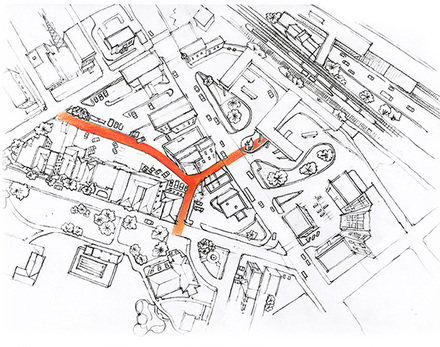
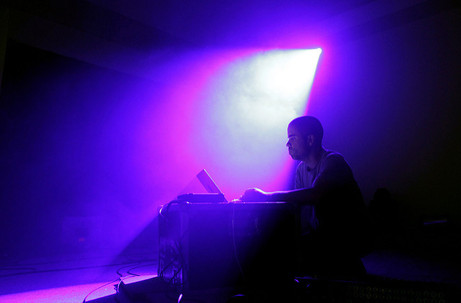
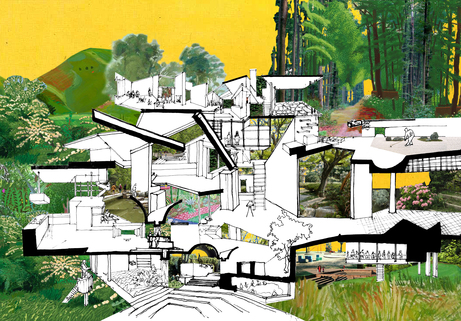
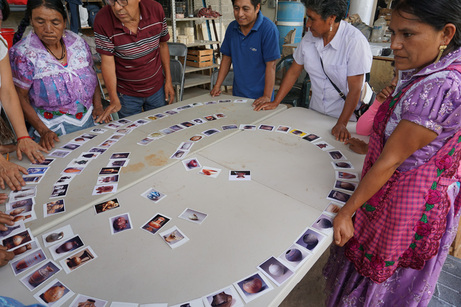
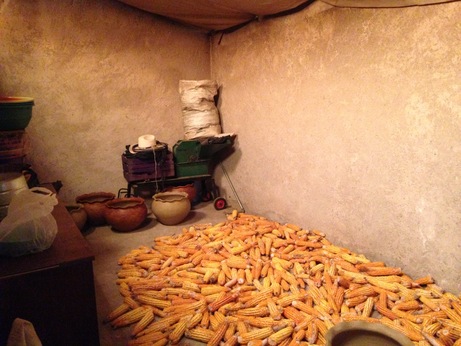
 PREVIOUS POSTS
PREVIOUS POSTS